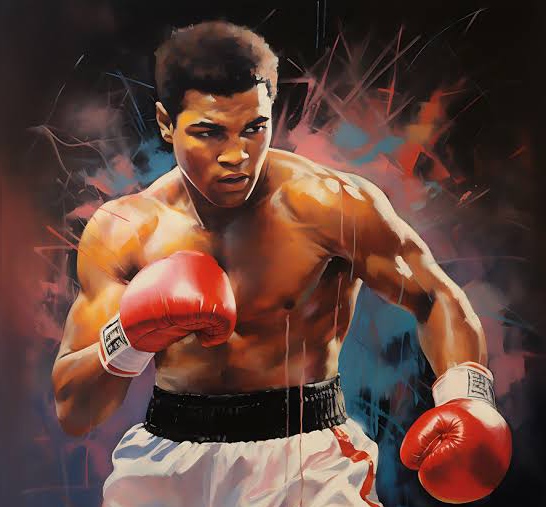Ali was known for his exceptional speed, agility, and defensive skills, which defied traditional heavyweight boxing styles. His famous footwork and “rope-a-dope” strategy were revolutionary. Beyond sports, he was a poet, activist, and an inspiration to millions worldwide.
Early Life
Muhammad Ali was born on January 17, 1942, in Louisville, Kentucky. His father, Cassius Clay Sr., was a sign painter, and his mother, Odessa Grady Clay, was a homemaker. He grew up in a segregated America, an experience that shaped his later activism.
At the age of 12, Ali took up boxing after his bicycle was stolen. He told a police officer, Joe Martin, that he wanted to “whup” the thief. Martin, who also trained young boxers, introduced Ali to the sport, and he quickly displayed remarkable talent.
Education
Ali attended Central High School in Louisville but struggled academically. His passion was boxing, and he devoted himself to the sport. He later received honorary degrees from various institutions in recognition of his achievements and contributions to society.
Career
Amateur Career
Ali’s amateur career was outstanding, with a record of 100 wins and 5 losses. His biggest achievement was winning a gold medal in the light heavyweight division at the 1960 Rome Olympics.
Professional Career
Ali turned professional in 1960 under the guidance of trainer Angelo Dundee. His early career was marked by an unbeaten streak, brash confidence, and poetic trash talk.
- 1964: Won the heavyweight championship by defeating Sonny Liston at age 22.
- 1967: Stripped of his title for refusing military induction during the Vietnam War.
- 1971: Lost to Joe Frazier in the “Fight of the Century.”
- 1974: Regained the title by defeating George Foreman in the “Rumble in the Jungle.”
- 1975: Defeated Joe Frazier in the brutal “Thrilla in Manila.”
- 1978: Lost and regained the title from Leon Spinks, becoming the first three-time heavyweight champion.
- 1981: Retired with a record of 56 wins (37 by KO) and 5 losses.
Physical Measurements
- Height: 6 feet 3 inches (191 cm)
- Weight: Approx. 215 lbs (97 kg) in prime
- Reach: 78 inches (198 cm)
Awards and Honors
- Olympic Gold Medal (1960)
- Three-time Heavyweight Champion
- Sports Illustrated’s “Sportsman of the Century” (1999)
- BBC’s “Sports Personality of the Century” (1999)
- Presidential Medal of Freedom (2005)
Personal Life
Ali was married four times and had nine children. His most famous child, Laila Ali, became a successful boxer. He converted to Islam in the 1960s and was a devout Muslim throughout his life.
Challenges and Obstacles
- Vietnam War Controversy (1967): Ali refused to be drafted, citing religious beliefs, and was stripped of his title, banned from boxing, and faced prison.
- Health Struggles: Diagnosed with Parkinson’s disease in 1984, which severely affected his mobility and speech.
Achievements and Successes
- Revolutionized boxing with his unique style and tactics.
- Advocated for civil rights and humanitarian causes.
- Became a global ambassador for peace and philanthropy.
Legacy
Ali’s legacy extends beyond sports. He remains an inspiration for athletes, activists, and anyone fighting for justice. His impact on racial equality, religious freedom, and humanitarian efforts is unparalleled.
Philosophy and Values
Ali believed in self-confidence, determination, and standing up for one’s beliefs. His famous quote, “Service to others is the rent you pay for your room here on earth,” defines his philosophy.
Influences and Mentors
- Joe Martin: Introduced Ali to boxing.
- Malcolm X: Played a key role in his early religious and political views.
- Elijah Muhammad: Leader of the Nation of Islam, which Ali joined in the 1960s.
Notable Works
- Fights: “Rumble in the Jungle,” “Thrilla in Manila,” “Fight of the Century.”
- Books: The Greatest: My Own Story, Soul of a Butterfly.
Publications and Media
- Documentaries: When We Were Kings, I Am Ali.
- Movies: Portrayed by Will Smith in Ali (2001).
Awards and Recognition
- Named the “Greatest Athlete of All Time” by various publications.
- Honored with statues and tributes worldwide.
Professional Memberships
- Member of the International Boxing Hall of Fame.
Community Involvement
- Muhammad Ali Center: A museum and cultural center in Louisville.
- Humanitarian Work: Raised millions for charities and humanitarian causes.
Hobbies and Interests
- Poetry and public speaking.
- Magic tricks and entertainment.
Travel and Exploration
Ali traveled extensively for fights, philanthropy, and advocacy, visiting over 100 countries.
Health and Wellness
Ali battled Parkinson’s disease for over three decades, inspiring others with his resilience.
Spirituality and Faith
Converted to Islam and remained deeply spiritual, advocating for religious tolerance and peace.
Legacy and Impact
Ali’s impact on sports, culture, and activism is immeasurable. His influence continues through books, films, and charitable organizations.
Quotes and Wisdom
- “Float like a butterfly, sting like a bee.”
- “I am the greatest. I said that even before I knew I was.”
- “He who is not courageous enough to take risks will accomplish nothing in life.”
Lessons Learned
Ali taught the world about courage, resilience, and standing up for one’s beliefs.
Challenges and Lessons
Despite immense challenges, Ali remained undaunted, proving that greatness transcends sports.
Personal Growth and Development
Ali evolved from a brash young fighter to a global ambassador for peace and philanthropy.
Thoughts and Reflections
Ali reflected deeply on life, often emphasizing faith, love, and service to humanity.
Timeline
- 1942: Born in Louisville, Kentucky.
- 1960: Wins Olympic gold.
- 1964: Wins heavyweight championship.
- 1967-1971: Boxing ban due to draft refusal.
- 1974: Wins “Rumble in the Jungle.”
- 1981: Retires from boxing.
- 1984: Diagnosed with Parkinson’s disease.
- 2005: Receives Presidential Medal of Freedom.
- 2016: Passes away on June 3 at age 74.
Family Tree
- Parents: Cassius Clay Sr. & Odessa Clay.
- Children: Laila Ali, Muhammad Ali Jr., and others.
Relationships
Married to Sonji Roi, Belinda Boyd, Veronica Porsche, and Yolanda Williams.
Career Highlights
- 56-5 record, 37 KOs.
- Three-time heavyweight champion.
Facts
- Initially named after a 19th-century abolitionist.
- First fighter to win the heavyweight title three times.
FAQs
Q: Why did Ali change his name?
A: He converted to Islam and rejected his “slave name.”
Q: How did Ali die?
A: He passed away from septic shock related to Parkinson’s disease.
Conclusion
Muhammad Ali’s legacy as an athlete, activist, and humanitarian is unmatched. His contributions to sports, culture, and social justice will never be forgotten. He truly was The Greatest.

